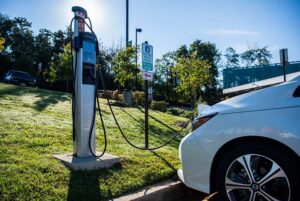Adoption of electric vehicles across the world is majorly dependent on the charging infrastructure and EV friendly policies that a country deploys for mass-scale EV adoption.
 To showcase a new perspective on the matter, Versinetic has published a new whitepaper, “Accelerating EV Adoption and Infrastructure.”
To showcase a new perspective on the matter, Versinetic has published a new whitepaper, “Accelerating EV Adoption and Infrastructure.”
The report provides key insights into UK EV infrastructure challenges, major EV trends and obstacles to EV adoption.
Based on a survey of EV stakeholders, the report identifies what still needs to happen for the UK to fulfill its Paris Agreement Target Policies to ensure all new vehicles sold by 2030 will be electric.
Versinetic’s report predominately centres around charging and reveals how on-street charging provisions; lack of government funding, constantly changing regulations and lack of EV maintenance skills need to improve in order to ensure and support increased EVs on UK roads, not least to limit global greenhouse gas emissions and slow down climate change.
More than 600,000 battery-electric cars are now on UK roads – up approximately 55% on last year’s figure. While EV adoption is growing, it is estimated that only 2% of cars in the UK are electric.
To meet its emissions targets, more UK drivers need to switch to electric cars which have a 70% lower climate impact than ICE vehicles.
Key report findings
60% of respondents in Versinetic’s research don’t believe the UK will meet its Paris Agreement targets, citing inadequate government strategies and attention/action to combat climate change and lack of infrastructure for green technology (EVs, fuel cells, renewable energy, etc.)
Significant challenges to EV adoption:
Lack of charging infrastructure: 70% of those surveyed cited insufficient on-street charging as the leading infrastructure challenge blocking EV adoption. A third of UK households have no driveway, so a robust public charging infrastructure is required for comprehensive EV use. So far, on-street chargers have been installed principally on pavements or in lampposts; introducing street-level clutter.
Lack of government funding £1.6 billion has been pledged to a new Electric Vehicle Infrastructure Strategy, which will be used to fund EV charging hubs and innovative on-street charging. Despite this, half of those surveyed believe that the government is not taking decisive enough action towards the development of the EV industry.
Constantly changing regulations: More than a third of respondents (39%) saw changing regulations as a barrier to the further development of EV infrastructure, with the speed at which regulations are launched making it difficult for charger manufacturers to keep up.
Lack of maintenance skills: Lack of maintenance skills was a concern for 23% of those polled. There is a shortfall of up to 35,000 skilled workers able to maintain the UK’s growing quantity of EVs with the UK needing 90,000 TechSafeTM technicians (trained with EVs) by 2030 (The Institute of the Motor Industry).
As well as the barriers to EV adoption, the report reveals major positive trends in the EV sector:
Developments in battery technology: Research and development into EV batteries has been growing at a fast pace recently and 57% of those surveyed agreed that this is one of the biggest trends in the EV industry.
EV-ready UK homes: As 46% of survey participants stated the government guarantee for new homes to be EV-ready with new builds legally to have EV chargers from 2022, increasing charging points by up 150,000 annually.
Public chargers upgrading: 38% of survey respondents believed that faster DC charging was one of the most important points of development in the EV sector. An ultra-rapid charger is up to 35 times quicker than a slow one. While the number of slow chargers has increased by 20% since 2021, there have been 70% more ultra-rapid charge points installed in the same period.
Dunstan Power, Versinetic Director and Co-Founder, said: “We believe that the EV industry today is ready to grow at the pace necessary to meet environmental targets, through innovation and public/private partnerships, but there are some significant challenges. Our research helps to shed some light on how the EV industry regards current progress, and where gaps remain.”
He continued, “In terms of what needs to happen for the UK to meet the targets, respondents to our industry survey agreed that investment was needed in areas such as alternative sources of energy, including fusion and nuclear power; more chargers to cope with the growing demand; audits of actual vs. target gains or reductions; stronger legislation on net zero solutions (e.g., planning laws, emission penalties); technology to maintain the future of EVs; and lowering the cost of public chargers.”
To view the full report, please click here.
